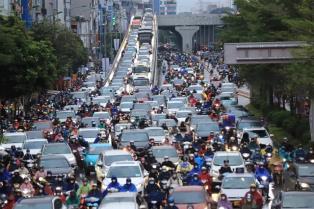The Ministry of Transport issued a circular to guide the implementation of Decree 116 that tightens control over quality, technical safety and environment protection of imported autos.

The Ministry of Transport issued a circular to guide the implementation of Decree 116 that tightens control over quality, technical safety and environment protection of imported autos.
Circular 03/2018/TT-BGTVT is a legal document under the Government’s Decree 116, which came into effect on January 1, 2018. It aims to clarify regulations of the decree, helping importers implement procedures when they import autos to the Vietnamese market.
The circular states that auto importers must obtain a Vehicle Type Approval (VTA) certification issued by authorities in the exporting country. VTA certifications are to show the vehicles’ standards on quality, technical safety and environment protection. If this cannot be obtained, a separate certificate of quality, technical safety and environment protection of the auto or engine must be provided.
In addition to this, while examining the quality of technical safety and environmental protection, auto importers will have to submit a number of dossiers, such as registration certificate of the imported cars for inspection of technical safety and security and protection of the environment; certified copies of the type of tires, rearview mirrors, front lights and glasses issued by competent agencies or organisations; original certificate of auto quality inspection issued by foreign automakers or automobile-assembling enterprises for each type of car.
Check on every batch of imported auto
As for the examination and testing of imported autos, the circular said each used imported auto must be examined for quality, technical safety and environment protection.
In terms of new cars, the certified bodies will check each batch of imported autos. The model representing each type must be tested on emission standards as well as quality and technical safety. Accordingly, the vehicles are required to meet Euro 4 emission standards (from 2018 to 2021) and Euro 5 standards (from 2022 onwards).
The inspection agency will randomly select one model. If the vehicle is qualified, the inspection agency will issue a certificate of quality for the batch.
Auto recalls
The vehicles will be recalled following announcement by automakers and in accordance with the requirement of inspection bodies.
Within five working days from the date of receipt of the recall notice from the automaker or inspection agency, the importers must notify in writing to its agents that they are not allowed to sell the products that are not yet fixed.
In addition to this, within a period of no more than 10 working days from the date of receipt of the recall notice, the importers must send a written report to the inspection body on the causes of technical errors, fixing measures, number of cars to be recalled and an appropriate recall plan.
The recall campaign will be posted on the websites of businesses and agents on time.
Decree 116 is a supportive measure for domestic companies as it sets up a number of technical barriers to limit the import of cars at a time when the import tax of automobiles from within the ASEAN bloc is zero per cent, which became effective from January 1 this year.
Under the decree, the only problem seems to be the obtaining of VTA certification by authorities in the exporting country.
Auto importers are also concerned about the testing of one model representing an entire batch, which will prove to be costly and time consuming. In the past, only the first shipment of each model would be tested.
A statement of the Japanese Chamber of Commerce and Industry in Viet Nam says one emission test could take two months and cost up to $10,000.
The Vietnamese market of imported autos will be favourable to those businesses who can adapt to this technical barrier. — VNS





